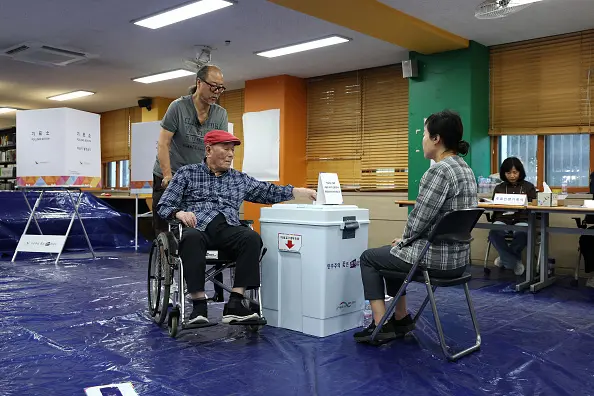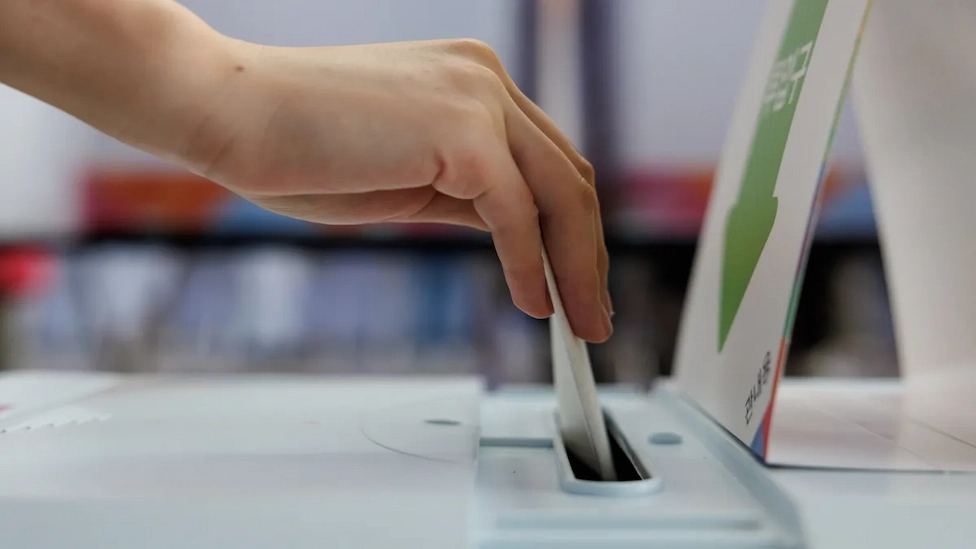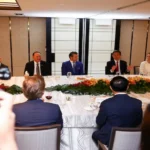South Korea Presidential Election 2025: On Tuesday, June 3, 2025, South Korea Presidential Election 2025 took place amid deep national turmoil. The vote follows former President Yoon Suk Yeol’s failed martial law attempt, which damaged the country’s democratic image.
Over 44 million people were eligible to vote, with polls open from 6 AM to 8 PM. The early turnout showed strong public interest. The winner will inherit a divided society and a slowing economy shaken by global protectionist policies. This high-stakes election is viewed as a defining moment in South Korea’s political and democratic journey.
Also Read | Yoon Suk-yeol Insurrection Trial Begins: Key Details and Implications
South Korea Presidential Election 2025: Insights
- Over 44.39 million voters were eligible for the South Korea Presidential Election 2025.
- Early voting saw more than one-third of the electorate cast their ballots.
- By 11 AM on Tuesday, June 3, 2025, 18% of voters had already voted.
- Frontrunners: Lee Jae-myung (liberal) vs. Kim Moon-soo (conservative).
- Lee led in final polls by 14 percentage points, with 49% support (Gallup Korea).
- The election follows Yoon Suk Yeol’s martial law declaration on December 3, 2025.
- Final vote counting is done by machine and verified by hand.
- No presidential transition is needed due to Yoon’s earlier impeachment and removal.
- Exit polls were set for release at 8 PM local time.
- The winner’s inauguration is expected shortly after the results are certified.
Background
The South Korea Presidential Election 2025 was triggered by a political crisis that began in December 2024. Then, President Yoon Suk Yeol attempted to impose martial law, which led to national outrage and his impeachment. The Constitutional Court removed him from office in April 2025.
His actions shocked many and raised concerns about democratic stability. South Korea has long been seen as a strong, though sometimes turbulent, democracy. The crisis created deep political divisions, prompting calls for reform. This election became a symbolic test of the nation’s democratic resilience.
Main Event
On June 3, 2025, citizens across South Korea participated in the South Korea Presidential Election 2025, which was seen as a major turning point. Voter turnout was high, with long lines at over 14,000 polling stations. More than 8 million voters had cast their ballots by 11 AM. Final turnout figures were expected to surpass previous elections.
Candidates Lee Jae-myung and Kim Moon-soo ended their intense campaigns on Monday night. Both held final rallies in Seoul, promising a better future and a stronger economy. Lee, representing the Democratic Party, focused on equity and support for working families. Kim, from the People Power Party, called for more freedom for businesses and fewer regulations.
The memory of Yoon’s martial law attempt loomed large. Lee called the vote “judgment day,” blaming Kim’s party for enabling Yoon. Kim, in turn, called Lee a “dictator,” accusing him of planning to change laws for political gain.
Yoon and his wife voted quietly at a school near their residence, avoiding media questions. Regular voters expressed hope that the new leader would restore calm and economic stability.
Exit polls were expected at 8 PM, followed by machine counts and manual verifications. A final result could arrive by early Wednesday. In 2022, a similar race ended at 3 AM, showing how close and emotional these elections can be. The South Korea Presidential Election 2025 has drawn intense public attention at home and abroad.

On June 3, 2025, a South Korean citizen votes in the presidential election at a polling center in Seoul.
Photo Credits: Chung Sung-Jun (Getty Images).
Also Read | South Korea Tariff Response: Seoul Boosts Export Support Amid U.S. Trade Pressure
Implications
The South Korea Presidential Election 2025 will affect the nation’s political and economic future. A new leader must heal divisions and rebuild trust after Yoon’s failed martial law. Public confidence in democracy has been shaken. Businesses hope for policy clarity, especially on trade and regulation.
Families are concerned about rising costs and job security. International partners, including the United States, will watch how the new government handles foreign policy. The winner must act fast to stabilize both politics and the economy. Unity and reform will be key themes in the coming weeks.
Conclusion
The South Korea Presidential Election 2025 marks a critical point in the nation’s journey. The winner must guide the country out of crisis and into a new phase of growth and stability. As the final results approach, citizens and the world are eager to see who will lead.
Experts predict early reforms with a focus on unity and economic recovery. The next president faces a tough path but also a rare chance to reset the country’s course.



